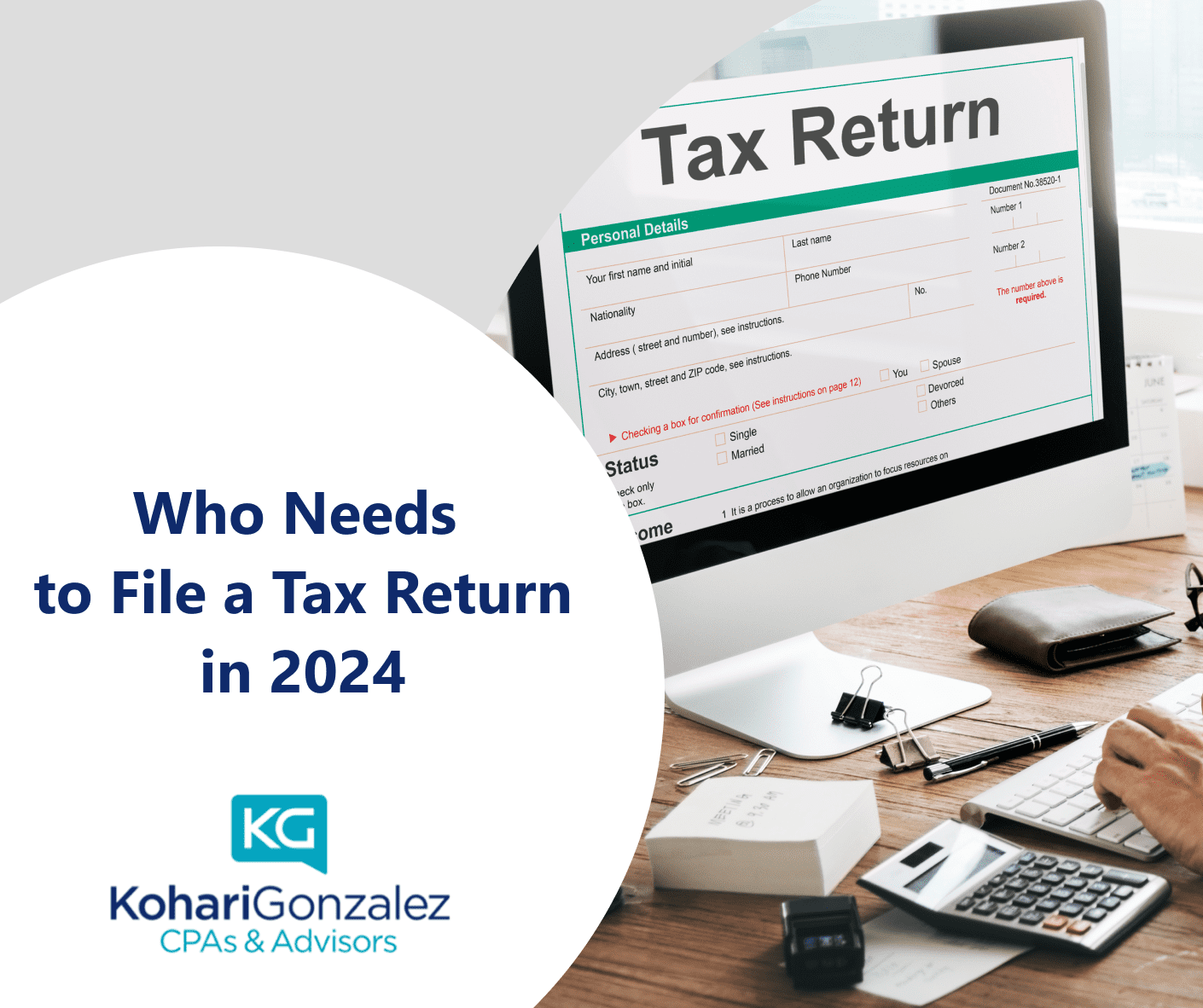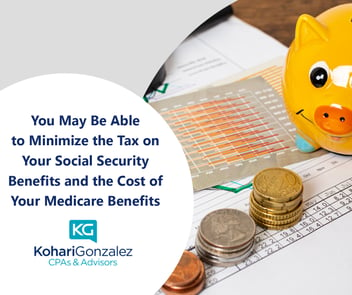
Article Highlights:
- Factors That Affect Whether Someone Needs to File a Tax Return
- Gross Income
- Required Filing Threshold
- 2023 Filing Thresholds by Filing Status
- Self-employment Status
- Status as a Dependent
- Some Individuals Should File a Tax Return Even Though Not Required to Do So
- Tax Withholding
- Earned Income Tax Credit (EITC)
- Child Tax Credit (CTC)/American Opportunity Tax Credit (AOTC)
Most U.S. citizens and permanent residents who work in the United States need to file a tax return if they make more than a certain amount for the year. This includes U.S. citizens and permanent residents working outside the U.S.
Factors That Affect Whether Someone Needs to File a Tax Return
Gross Income
Gross income means all income a person received in the form of money, goods, property, and services that aren't exempt from tax. This includes any income from sources outside the United States or from the sale of a main home, even if you can exclude part or all of it.
Required Filing Threshold
An individual whose gross income is over the required filing threshold for their filing status and age needs to file a return. So, individuals may need to consider their potential filing status as well when determining if they are required to file a return. There are five filing statuses:
- Single
- Head of household
- Married filing jointly
- Married filing separate
- Qualifying surviving spouse
| 2023 FILING THRESHOLDS BY FILING STATUS | ||
| Filing Status | Age at the End of 2023 | A Person Must File a Return If Their Gross Income Was At Least: |
| Single | Under 65 | $13,850 |
| Single | 65 or Older | $15,700 |
| Head of Household | Under 65 | $20,800 |
| Head of Household | 65 or Older | $22,650 |
| Married Filing Jointly | Both Spouses Under 65 | $27,700 |
| Married Filing Jointly | One Spouse 65 or Older | $29,200 |
| Married Filing Jointly | Both Spouses 65 and Older | $30,700 |
| Married Filing Separately | Any Age | $5 |
| Qualified Surviving Spouse | Under 65 | $27,700 |
| Qualified Surviving Spouse | 65 or Older | $29,200 |
Self-employment Status
Status as a Dependent
- A dependent child with earned income more than $13,850 (the 2023 standard deduction for a single individual) is required to a file a return. Earned income includes salaries, wages, tips, professional fees, and other amounts received as pay for work performed.
- The standard deduction for a dependent in 2023 is limited by the larger of $1,250 or their earned income plus $400, but not to exceed the $13,850 standard deduction for a single individual.
- Dependent children with unearned income of more than $2,500 may also need to file a return. Unearned income is investment-type income and includes interest, dividends and capital gains, rents, royalties, etc. Distributions of interest, dividends, capital gains and other unearned income from a trust are also unearned income to a beneficiary of the trust.
- Where a dependent child's only income is interest, dividends, and capital gain distributions and totals less than $12,500, the parent may be able to elect to include that income on their return rather than file a return for the child.
A parent or guardian must file a tax return for a dependent who needs to file but isn't able to file their own return.
Other Situations May Require Filing
A tax return may be required even when a person's gross income is less than the threshold amount for required filing. These situations include when the individual owes special taxes such as the alternative minimum tax (AMT), retirement plan or IRA taxes for excess contributions or failing to take required distributions, employment taxes for household workers, when distributions were made from health savings accounts (HSAs), and when the individual benefited from advance payments of the premium tax credit when enrolled for health insurance coverage through a Marketplace.
Some Individuals Should File a Tax Return Even Though Not Required to Do So
Just because someone is not required to file a return does not mean they shouldn't. Failing to file a return could end up leaving large sums of money in Uncle Sam's pocket. Here are some examples.
Tax Withholding
Most individuals who have wage income also have federal income tax withheld on their earnings. That withheld tax would be 100% refundable if the worker isn't required to file a return.
A tax credit is a dolla for-dollar offset against the tax liability. Some credits can only reduce a tax liability to zero, while others as discussed below are refundable, meaning if the credit is more than the individual's tax any excess credit is refundable. So, if an individual is not required to file, and therefore owes no tax, and qualifies for one or more refundable credits, it may be in their best interest to file and take advantage of the credit(s).
Earned Income Tax Credit (EITC)
The EITC is for people who work but have lower incomes. If you qualify, it could be worth up to $7,430 in 2023. The credit is a fully refundable credit, so individuals can receive the full amount of the credit even if they do not owe any taxes.
If you were employed for at least part of 2023, you may be eligible for the EITC based on these general requirements and earned less than:
- $17,640 ($24,210 if married filing jointly) and have no qualifying children.
- $46,560 ($53,120 if married filing jointly) and have one qualifying child.
- $52,918 ($59,478 if married filing jointly) and have two qualifying children.
- $56,838 ($63,398 if married filing jointly) and have more than two qualifying children.
Child Tax Credit (CTC)
This is a per child credit that phases out for higher income taxpayers but is available to all categories of taxpayers that are not required to file. To qualify, the child must be under age 17 at the end of 2023. The full credit is $2,000 per child, but the refundable amount is limited to a maximum amount of $1,600 for 2023. However, there is pending legislation that if passed by Congress would increase that amount to $1,800.
American Opportunity Tax Credit (AOTC)
The AOTC provides a credit of up to $2,500 per year per eligible student with higher education expenses. Up to 40% of the AOTC is refundable, even when there is no tax liability. Thus, it can result in a refund of as much as $1,000 (40% of $2,500).
Generally, an eligible student for the AOTC can be the filer and spouse and their dependents that are enrolled at an eligible educational institution for at least one academic period (semester, trimester, quarter) during the year.
If someone other than the filer, a spouse or their claimed dependent directly makes a payment to an eligible educational institution for a student's qualified tuition and related expenses, then the filer is treated as paying the expenses and qualifies for the credit.
Thus, even if not required to file, individuals could still have a refund in the thousands of dollars. The IRS has indicated that about 25% of those eligible for the EITC fail to claim it. Individuals should not miss out on the refundable credits simply because they are not required to file. If you are one of those that is not required to file, contact this office to see if you can benefit by filing and for assistance in preparing the return. If you didn't file in prior years, you may have refunds for those years as well.
However, there is a statute of limitation on refunds which is generally 3 years after the April due date. That means that in most cases the ability to file a 2020 return for refund ends April 15, 2024.
Also to be considered is whether you have any state income tax filing obligations and are there refundable state tax credits you may be entitled to even if you aren't required to file.
If you have questions related to your 2023 filing requirements or filing prior years' returns, please contact this office.



